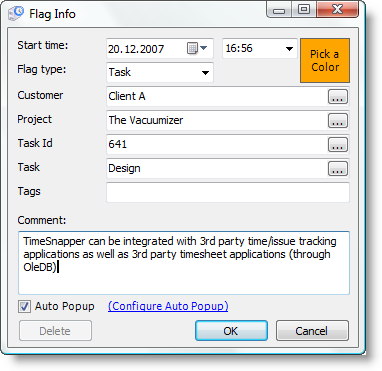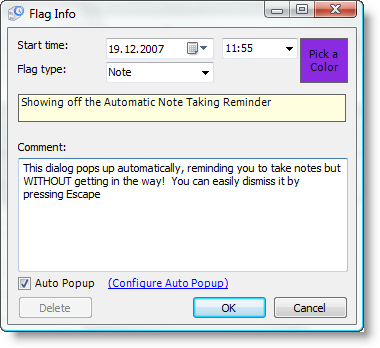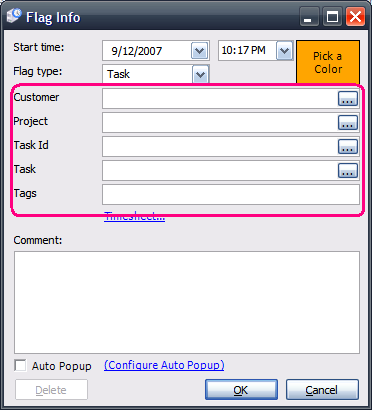Difference between revisions of "Flags"
LeonBambrick (talk | contribs) |
Atlioddsson (talk | contribs) (→A Task) |
||
| Line 20: | Line 20: | ||
== A Task == | == A Task == | ||
| − | a Task | + | a Task can have more fields defined |
[[Image:Ts-flag-task.png]] | [[Image:Ts-flag-task.png]] | ||
| − | |||
== A Note == | == A Note == | ||
Revision as of 12:26, 28 July 2015
If you want to keep track of every other things that happens to you (apart from the things that TimeSnapper captures automatically) then Flags are your friend.
When you add a Flag it shows up in the Day Browser, it can be seen in Reports and (if you choose) in your Timesheet.
To add a flag at any time, click on the little TimeSnapper icon in the task tray... ![]() ...and choose 'New Flag'
...and choose 'New Flag'
A New Flag is a beautiful thing!
There are four types of flags....
- a Task
- a Note
- a Break, or
- End of day
What is the meaning of these four types of Flags?
A Task
a Task can have more fields defined
A Note
a Note is way of annotating your time.
a Break
End of Day
Auto Popup
You can make popping up the flags dialog totally automatic, what we call the "Auto Popup Note Taking Reminder" feature.
Automatically pop up 'New flag dialog'
- every X [hours or minutes]
- but only after X [minutes or seconds] of inactivity
- every [day or weekday]
- between [09:00] and [18:00]
- showing dialog: [in front of every other dialog | minimized and flashing]
By setting the "inactivity" setting to e.g. 1 minute, you make sure that the dialog doesn't interrupt you while you are actively working at the computer. It would only pop up if it was time AND you hadn't touched the computer for 1 minute.
Lookups
Lookups can be populated by any OLE-DB compliant database... even excel!



